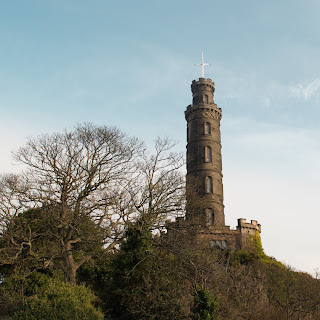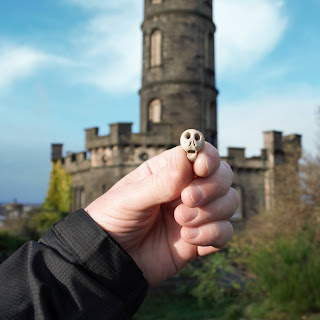I have many fond memories of Calton Hill and days of misspent youth there. On a cold, February morning in 1982 the kid’s TV programme Swap Shop was live on the hill in front of the National Monument. I have a memory of the main stage being a boxing ring, not metaphorically, but it literally was an actual boxing ring. We then had the excitement of watching the Revillos mime to their song ‘Bongo Brain.’ There is an extremely lo-fi and wobbly video of this available on YouTube.
The Revillos on Swap Shop at Calton Hill, Edinburgh
In the summers of the mid 1980s my friends and I used to go up the hill and sit by the pillars of the National Monument of Scotland (or Edinburgh’s Disgrace, as we knew it). There we’d smoke fags and drink cheap, nasty lager and think we were cool. We were not cool, but rather just a bunch of slightly pissed and noisy teenage geeks.
Other than the National Monument,
Calton Hill is cluttered with exciting, old buildings such as the Dugald
Stewart Monument, the Old Observatory House, the City Observatory, and Nelson’s
Monument. It also has some spectacular
views over Edinburgh.
A brief history of the main buildings is –
The National Monument of Scotland was
built to commemorate the Scottish soldiers and sailors who died in the Napoleonic
Wars. It is modelled on the Parthenon in
Athens and work began on it in 1826. However,
by 1829 the money for its construction had run out and it was left unfinished.
The Dugald Stewart Monument is a memorial
to the Scottish Philosopher and mathematician Dugald Stewart (1753-1828). Regarded as an important figure in the Scottish
Enlightenment he published many philosophical essays. Here’s a little quote from him – ‘There are
very few original thinkers in the world, or ever have been; the greatest part
of those who are called philosophers, have adopted the opinions of some who
went before them.’
The Old Observatory House was designed
by the architect James Craig and was originally built as a family home. It was then used by astronomers for a short
time. It is now rented out as holiday accommodation.
The City Observatory was built in 1818 and
was used until 1896 when due to light pollution from the city centre, it was
decided to move to the Royal Observatory at Blackford Hill.
Nelson’s Monument was built between
1807 and 1816 to commemorate Vice Admiral Horatio Nelson’s victory over the
French and Spanish Fleets at the Battle of Trafalgar in 1805, and his death
during the same battle. In 1852 a
mechanised time ball was added that was synchronised with the one o’clock gun
fired daily from Edinburgh Castle. The
time ball dropped daily allowing ships in Leith Harbour to set their
chronometers by it.
I left the Skulferatu, that came on my
walk in a gap in a tree, just on the hill leading up to
Nelson’s Monument.
The coordinates for the location of the
Skulferatu are: Latitude 55.954352 Longitude -3.182646.











